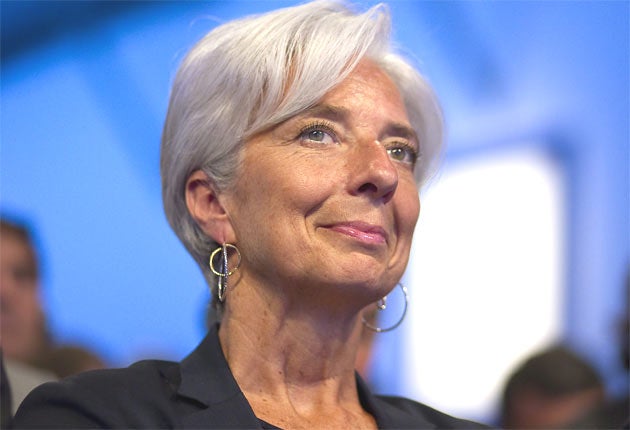France seeks swift succession to end protests over IMF post
Emerging economies object to 'carve-up' but do not have a strong candidate to replace Strauss-Kahn

Your support helps us to tell the story
From reproductive rights to climate change to Big Tech, The Independent is on the ground when the story is developing. Whether it's investigating the financials of Elon Musk's pro-Trump PAC or producing our latest documentary, 'The A Word', which shines a light on the American women fighting for reproductive rights, we know how important it is to parse out the facts from the messaging.
At such a critical moment in US history, we need reporters on the ground. Your donation allows us to keep sending journalists to speak to both sides of the story.
The Independent is trusted by Americans across the entire political spectrum. And unlike many other quality news outlets, we choose not to lock Americans out of our reporting and analysis with paywalls. We believe quality journalism should be available to everyone, paid for by those who can afford it.
Your support makes all the difference.Despite protests by emerging countries, Europe moved yesterday to maintain its stranglehold on one of the key jobs in world politics, the leadership of the International Monetary Fund (IMF).
After winning the overt backing of all EU governments, and the unspoken approval of the US and China, the French Finance Minister, Christine Lagarde, announced that she was a candidate to fill the vacancy left by the resignation of Dominique Strauss-Kahn.
The world's emerging economies have objected to the unwritten rule that Europeans should hold the top job at the IMF, which provides loans and economic advice to heavily indebted and struggling countries. But an unstoppable momentum is expected to build behind the Lagarde candidature when leaders of the world's richest countries meet for a G8 summit in Deauville in Normandy today and tomorrow.
Ms Lagarde also faces a potential legal investigation for alleged abuse of ministerial power in France. Neither this issue, nor the complaints of emerging nations, should block her election in late June
Senior officials representing the so-called Brics group of emerging nations – Brazil, Russia, India, China and South Africa – protested that the 60-year European monopoly on the job was "obsolete". Nogueira Batista, the IMF executive director from Brazil, said it was "outrageous" that, more than six decades after a transatlantic carve-up of the world's top economic jobs, there remained an unspoken assumption that the managing director of the IMF should, once again, come from Europe.
But the Brics countries have not come up with a strong candidate of their own and China has, according to French officials, said privately that it will support Ms Lagarde.
The formal Brics protest is, therefore, seen as a kind of long-range warning by emerging countries. They expect the shift in the economic balance of power away from Europe and the US to be reflected in the choice of Ms Lagarde's successor as IMF managing director in five years.
Ms Lagarde, 55, was an international, corporate lawyer rather than an economic expert before she was head-hunted to join the French government in 2005. As Finance Minister since 2007, her fluent English and confident, friendly manner have made her a favourite with the world's media.
As a former head of a Chicago-based US law firm, Baker & McKenzie, she is popular in the US. She is admired by emerging countries for advocating a small tax on all financial transactions to fund aid for those nations.
From a European point of view, the strength of Ms Lagarde's candidacy is a godsend. The arrest of Mr Strauss-Kahn, on charges of attempted rape in New York, had threatened to destabilise the close co-operation between European countries and the IMF on attempts to solve the debt crisis in euroland. Ms Lagarde is seen, in Europe, as not only a wise and calm head but a guarantee of continuity.
"It is an immense challenge which I approach with humility and in the hope of achieving the broadest possible consensus," Ms Lagarde told reporters yesterday. "If I'm elected I'll bring all my expertise as a lawyer, a minister, a manager and a woman to the job," she said. Ms Lagarde would be the first woman to head the IMF. She has long argued that world politics and finance is too male-dominated. She told The Independent in February: "In gender-dominated environments, men have a tendency to... show how hairy-chested they are... I honestly think there should never be too much testosterone in one room."
The vote is expected in late June, at the 24-member IMF executive board. Although the IMF has 187 member countries, membership of the executive board and voting power is heavily concentrated in the hands of the world's largest economies. A nod from the G8 summit this week would virtually assure Ms Lagarde's election.
But she does face a potential stumbling block at home. A special court which investigates alleged ministerial wrongdoing will decide on 10 June whether to investigate Ms Lagarde's role in a generous €285m pay-off in 2008 to the disgraced French tycoon and politician Bernard Tapie.
He was stripped of his ownership of the Adidas sports company in the 1990s. After a long legal battle, Ms Lagarde approved a private, rather than judicial, arbitration in Mr Tapie's favour. This decision is alleged to have been inspired by President Nicolas Sarkozy as a pay-off for the leftist Mr Tapie's support during the 2007 election.
Join our commenting forum
Join thought-provoking conversations, follow other Independent readers and see their replies
Comments